Guojun Chen
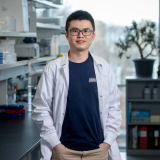 Prof. Guojun Chen’s lab focuses on engineering intelligent biomaterials for drug delivery, with the ultimate goal towards precision medicine. They are also interested in understanding and exploiting the interactions between biomaterials and biological systems for therapeutic applications. Prof. Guojun Chen’s lab focuses on engineering intelligent biomaterials for drug delivery, with the ultimate goal towards precision medicine. They are also interested in understanding and exploiting the interactions between biomaterials and biological systems for therapeutic applications.
Learn more
|
Katie Cockburn
 Prof. Katie Cockburn's lab studies stem cell dynamics in the living skin. Her research focuses on the way in which stem cells perform behaviors such as self-renewal and differentiation at the right times and places to support lifelong maintenance of skin tissues. Her group aims to build a picture of how healthy regeneration is orchestrated at the level of individual cells, local cellular neighborhoods and tissue-wide cues. Prof. Katie Cockburn's lab studies stem cell dynamics in the living skin. Her research focuses on the way in which stem cells perform behaviors such as self-renewal and differentiation at the right times and places to support lifelong maintenance of skin tissues. Her group aims to build a picture of how healthy regeneration is orchestrated at the level of individual cells, local cellular neighborhoods and tissue-wide cues.
Learn more
|
Josée Dostie
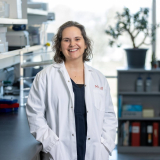 Prof. Josée Dostie's lab is working towards defining how the human genome is organized in three-dimensions, and identifying mechanisms that regulate spatial chromatin organization. We are applying genomics and molecular biology approaches to understand how genome folding impinges on gene expression in normal and diseased tissues such as in cancers. Prof. Josée Dostie's lab is working towards defining how the human genome is organized in three-dimensions, and identifying mechanisms that regulate spatial chromatin organization. We are applying genomics and molecular biology approaches to understand how genome folding impinges on gene expression in normal and diseased tissues such as in cancers.
Learn more
|
Thomas Duchaine
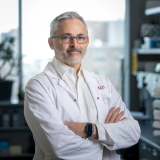 Prof. Thomas Duchaine’s group focuses on the RNA- interference (RNAi) pathways, such as the diverse endogenous RNAi pathways and microRNA-mediated silencing. They examine the impact of these gene silencing mechanisms on the regulation of gene networks and their roles in cancer. Prof. Thomas Duchaine’s group focuses on the RNA- interference (RNAi) pathways, such as the diverse endogenous RNAi pathways and microRNA-mediated silencing. They examine the impact of these gene silencing mechanisms on the regulation of gene networks and their roles in cancer.
Learn more
|
Vincent Giguère
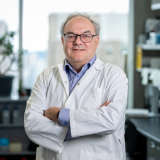 Prof. Vincent Giguère's lab studies the role of nuclear receptors in development, physiology and diseases, especially in hormone-dependent cancers. Prof. Vincent Giguère's lab studies the role of nuclear receptors in development, physiology and diseases, especially in hormone-dependent cancers.
Learn more
|
Philippe Gros
 Prof. Philippe Gros uses genetic analysis in mutant mouse models and in human patients cohorts to identify the molecular pathways and proteins required for protection against infections and whose sustained activation leads to chronic inflammation. Prof. Philippe Gros uses genetic analysis in mutant mouse models and in human patients cohorts to identify the molecular pathways and proteins required for protection against infections and whose sustained activation leads to chronic inflammation.
Learn more
|
Sidong Huang
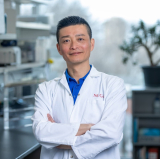 Prof. Sidong Huang’s group uses functional genomic tools to study cancer-relevant pathways and to guide cancer therapy. They aim to identify mechanisms of drug resistance and to uncover cancer dependencies that can be exploited therapeutically. Prof. Sidong Huang’s group uses functional genomic tools to study cancer-relevant pathways and to guide cancer therapy. They aim to identify mechanisms of drug resistance and to uncover cancer dependencies that can be exploited therapeutically.
Learn more
|
Lawrence Kazak
 Prof. Lawrence Kazak's lab focuses on the molecular control of mammalian energy metabolism and its influence on physiology. The lab uses genetic and biochemical approaches in purified organelles, cultured cells and genetically engineered mice to investigate the control of thermogenic pathways in brown adipocytes that support energy expenditure. Prof. Lawrence Kazak's lab focuses on the molecular control of mammalian energy metabolism and its influence on physiology. The lab uses genetic and biochemical approaches in purified organelles, cultured cells and genetically engineered mice to investigate the control of thermogenic pathways in brown adipocytes that support energy expenditure.
Learn more
|
Luke McCaffrey
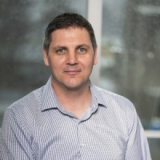 Prof. McCaffrey’s lab addresses fundamental questions in cell biology to understand mechanisms of breast cancer initiation and progression. His lab utilizes animal models, 3D organoids, and patient-derived tissue to interrogate dynamic behaviors between normal or cancer cells and their microenvironment. A goal of this research is to understand how cell and tissue organization influence the growth and invasive properties in cancer, to improve predictive, preventative, and therapeutic options. Prof. McCaffrey’s lab addresses fundamental questions in cell biology to understand mechanisms of breast cancer initiation and progression. His lab utilizes animal models, 3D organoids, and patient-derived tissue to interrogate dynamic behaviors between normal or cancer cells and their microenvironment. A goal of this research is to understand how cell and tissue organization influence the growth and invasive properties in cancer, to improve predictive, preventative, and therapeutic options.
Learn more
|
William Muller
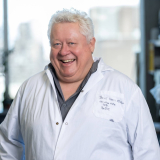 Prof. William Muller's lab develops genetically engineered mouse models (GEMMs) to investigate mammary tumourigenesis, tumour progression and metastasis. Through combining GEMMs with molecular and cellular techniques, bioinformatic approaches and analysis of clinical samples, they identify critical signaling pathways and potential therapeutic targets in breast cancer, focusing on aggressive luminal tumours and those driven by the oncogene ErbB2/HER2. Prof. William Muller's lab develops genetically engineered mouse models (GEMMs) to investigate mammary tumourigenesis, tumour progression and metastasis. Through combining GEMMs with molecular and cellular techniques, bioinformatic approaches and analysis of clinical samples, they identify critical signaling pathways and potential therapeutic targets in breast cancer, focusing on aggressive luminal tumours and those driven by the oncogene ErbB2/HER2.
Learn more
|
Alain Nepveu
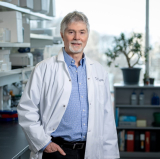 Prof. Alain Nepveu's group investigates how alterations in DNA repair and DNA damage responses contribute to the initiation and progression of cancer. The group is looking at how certain cancer cells become dependent on the base excision repair pathway, and how efficient base excision repair can enable cancer cells to resist radiotherapy and chemotherapy. One goal is to identify "druggable" biochemical activities that are essential to cancer cells, but dispensable to normal cells, in order to develop novel therapeutics. Prof. Alain Nepveu's group investigates how alterations in DNA repair and DNA damage responses contribute to the initiation and progression of cancer. The group is looking at how certain cancer cells become dependent on the base excision repair pathway, and how efficient base excision repair can enable cancer cells to resist radiotherapy and chemotherapy. One goal is to identify "druggable" biochemical activities that are essential to cancer cells, but dispensable to normal cells, in order to develop novel therapeutics.
Learn more
|
Morag Park
 Prof. Morag Park’s lab focuses on: 1) The molecular and cellular biology of the receptor tyrosine kinase and proto-oncogene MET, its functions and regulation in normal cells and malignant cells; 2) The composition, organization and functional roles of the tumour microenvironment, particularly in triple negative breast cancer (TNBC). By integrating cutting edge cellular, transgenic and patient-derived models with unique biobanks of breast cancer patient samples, they uncover key mechanisms involved in tumourigenesis, tumour progression and drug resistance. Prof. Morag Park’s lab focuses on: 1) The molecular and cellular biology of the receptor tyrosine kinase and proto-oncogene MET, its functions and regulation in normal cells and malignant cells; 2) The composition, organization and functional roles of the tumour microenvironment, particularly in triple negative breast cancer (TNBC). By integrating cutting edge cellular, transgenic and patient-derived models with unique biobanks of breast cancer patient samples, they uncover key mechanisms involved in tumourigenesis, tumour progression and drug resistance.
Learn more
|
Arnim Pause
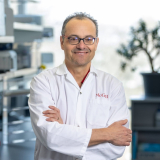 Prof. Arnim Pause’s group studies cancer-relevant signalling pathways involved in energy metabolism and cell surface receptor trafficking. Prof. Arnim Pause’s group studies cancer-relevant signalling pathways involved in energy metabolism and cell surface receptor trafficking.
Learn more
|
Jerry Pelletier
 Prof. Jerry Pelletier applies chemical biology and genetic approaches to dissect and target vulnerabilities in the translation initiation pathway. Insight gained from these studies will help better understand the regulation of tumor intrinsic and extrinsic survival processes. Prof. Jerry Pelletier applies chemical biology and genetic approaches to dissect and target vulnerabilities in the translation initiation pathway. Insight gained from these studies will help better understand the regulation of tumor intrinsic and extrinsic survival processes.
Learn more
|
Daniela Quail
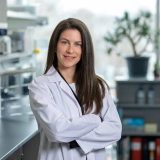 Prof. Daniela Quail’s lab studies the role of the tumor microenvironment during cancer initiation and progression. Their primary interest is the myeloid compartment in tumor immunology. Prof. Daniela Quail’s lab studies the role of the tumor microenvironment during cancer initiation and progression. Their primary interest is the myeloid compartment in tumor immunology.
Learn more
|
Peter Siegel
 Prof. Peter Siegel's lab focuses on delineating mechanisms that control cancer cells' ability to metastasize to different organs and tissues in the body. Our research investigates how cancer cells interact with the distinct microenvironments to form metastases in sites like the bone, lungs, liver or brain. We work to identify functionally important and clinically validated mediators of the metastatic process that can be targeted through the generation of novel therapeutic agents. Prof. Peter Siegel's lab focuses on delineating mechanisms that control cancer cells' ability to metastasize to different organs and tissues in the body. Our research investigates how cancer cells interact with the distinct microenvironments to form metastases in sites like the bone, lungs, liver or brain. We work to identify functionally important and clinically validated mediators of the metastatic process that can be targeted through the generation of novel therapeutic agents.
Learn more
|
Nahum Sonenberg
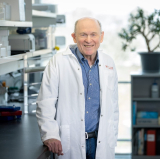 Prof. Nahum Sonenberg’s research focuses on the molecular basis of the control of protein synthesis in eukaryotic cells and its importance in cancer and neurological diseases. Our research has identified various mRNA translation factors involved in the control of protein synthesis along with their integration with several key signalling pathways, we believe targeting these pathways should facilitate the design of novel therapeutic. Prof. Nahum Sonenberg’s research focuses on the molecular basis of the control of protein synthesis in eukaryotic cells and its importance in cancer and neurological diseases. Our research has identified various mRNA translation factors involved in the control of protein synthesis along with their integration with several key signalling pathways, we believe targeting these pathways should facilitate the design of novel therapeutic.
Learn more
|
Jose Teodoro
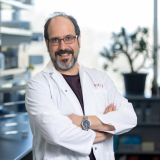 Prof. Jose Teodoro’s research program aims to identify the molecular pathways that limit tumour growth and to delineate the mechanisms by which they become subverted in cancer. Prof. Jose Teodoro’s research program aims to identify the molecular pathways that limit tumour growth and to delineate the mechanisms by which they become subverted in cancer.
Learn more
|
Michel Tremblay
 In order to understand and find cures for human diseases, Prof. Michel Tremblay's lab focuses on protein tyrosine phosphatases (PTPases), which play an essential role in many biological and pathological processes. The lab is aiming to develop new treatments for a broad range of human diseases such as diabetes, obesity, spinal cord injury and infectious diseases as well as diverse cancers. In order to understand and find cures for human diseases, Prof. Michel Tremblay's lab focuses on protein tyrosine phosphatases (PTPases), which play an essential role in many biological and pathological processes. The lab is aiming to develop new treatments for a broad range of human diseases such as diabetes, obesity, spinal cord injury and infectious diseases as well as diverse cancers.
Learn more
|
Logan Walsh
 Prof. Logan Walsh's lab focuses on using translational genetics and immunogenomics to develop personalized medicine strategies. Prof. Logan Walsh's lab focuses on using translational genetics and immunogenomics to develop personalized medicine strategies.
Learn more
|
Ian Watson
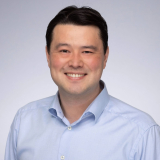 Prof. Ian Watson's research focuses on understanding how mutated genes identified in next-generation sequencing studies promote cutaneous melanoma disease progression by modulating the response to targeted therapies and immune checkpoint inhibitors. To address this challenge, his lab utilizes an inter-disciplinary approach combining unbiased molecular characterization of melanoma tumors, rapid development of preclinical models using genome-editing technology, and bioinformatics tools. Prof. Ian Watson's research focuses on understanding how mutated genes identified in next-generation sequencing studies promote cutaneous melanoma disease progression by modulating the response to targeted therapies and immune checkpoint inhibitors. To address this challenge, his lab utilizes an inter-disciplinary approach combining unbiased molecular characterization of melanoma tumors, rapid development of preclinical models using genome-editing technology, and bioinformatics tools.
Learn more
|
Yojiro Yamanaka
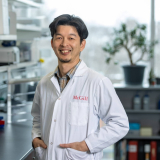 Prof. Yojiro Yamanaka’s group studies the mechanisms regulating epithelial morphogenesis in development and cancer. Using mouse models and in vitro 3D culture, they investigate early events of ovarian cancer and peritoneal metastasis. Prof. Yojiro Yamanaka’s group studies the mechanisms regulating epithelial morphogenesis in development and cancer. Using mouse models and in vitro 3D culture, they investigate early events of ovarian cancer and peritoneal metastasis.
Learn more
|
Xiang Jiao Yang
 Prof. Xiang Jiao Yang has been investigating the intimate link of epigenetic regulation to developmental disorders (such as syndromic intellectual disability) and cancer, with a key interest in how different stem cells (like neural and hematopoietic stem cell) develop and are then maintained. Prof. Xiang Jiao Yang has been investigating the intimate link of epigenetic regulation to developmental disorders (such as syndromic intellectual disability) and cancer, with a key interest in how different stem cells (like neural and hematopoietic stem cell) develop and are then maintained.
Learn more
|
George Zogopoulos
 Prof. George Zogopoulos’ research focuses on the genetics and oncogenomics of pancreaticobiliary cancers. Prof. George Zogopoulos’ research focuses on the genetics and oncogenomics of pancreaticobiliary cancers.
Learn more
|
Heather Melichar
 Prof Heather Melichar's research focuses on T-cell biology. Prof Heather Melichar's research focuses on T-cell biology.
Learn more
|
 Prof. Guojun Chen’s lab focuses on engineering intelligent biomaterials for drug delivery, with the ultimate goal towards precision medicine. They are also interested in understanding and exploiting the interactions between biomaterials and biological systems for therapeutic applications.
Prof. Guojun Chen’s lab focuses on engineering intelligent biomaterials for drug delivery, with the ultimate goal towards precision medicine. They are also interested in understanding and exploiting the interactions between biomaterials and biological systems for therapeutic applications. Prof. Katie Cockburn's lab studies stem cell dynamics in the living skin. Her research focuses on the way in which stem cells perform behaviors such as self-renewal and differentiation at the right times and places to support lifelong maintenance of skin tissues. Her group aims to build a picture of how healthy regeneration is orchestrated at the level of individual cells, local cellular neighborhoods and tissue-wide cues.
Prof. Katie Cockburn's lab studies stem cell dynamics in the living skin. Her research focuses on the way in which stem cells perform behaviors such as self-renewal and differentiation at the right times and places to support lifelong maintenance of skin tissues. Her group aims to build a picture of how healthy regeneration is orchestrated at the level of individual cells, local cellular neighborhoods and tissue-wide cues. Prof. Josée Dostie's lab is working towards defining how the human genome is organized in three-dimensions, and identifying mechanisms that regulate spatial chromatin organization. We are applying genomics and molecular biology approaches to understand how genome folding impinges on gene expression in normal and diseased tissues such as in cancers.
Prof. Josée Dostie's lab is working towards defining how the human genome is organized in three-dimensions, and identifying mechanisms that regulate spatial chromatin organization. We are applying genomics and molecular biology approaches to understand how genome folding impinges on gene expression in normal and diseased tissues such as in cancers. Prof. Thomas Duchaine’s group focuses on the RNA- interference (RNAi) pathways, such as the diverse endogenous RNAi pathways and microRNA-mediated silencing. They examine the impact of these gene silencing mechanisms on the regulation of gene networks and their roles in cancer.
Prof. Thomas Duchaine’s group focuses on the RNA- interference (RNAi) pathways, such as the diverse endogenous RNAi pathways and microRNA-mediated silencing. They examine the impact of these gene silencing mechanisms on the regulation of gene networks and their roles in cancer. Prof. Vincent Giguère's lab studies the role of nuclear receptors in development, physiology and diseases, especially in hormone-dependent cancers.
Prof. Vincent Giguère's lab studies the role of nuclear receptors in development, physiology and diseases, especially in hormone-dependent cancers. Prof. Philippe Gros uses genetic analysis in mutant mouse models and in human patients cohorts to identify the molecular pathways and proteins required for protection against infections and whose sustained activation leads to chronic inflammation.
Prof. Philippe Gros uses genetic analysis in mutant mouse models and in human patients cohorts to identify the molecular pathways and proteins required for protection against infections and whose sustained activation leads to chronic inflammation. Prof. Sidong Huang’s group uses functional genomic tools to study cancer-relevant pathways and to guide cancer therapy. They aim to identify mechanisms of drug resistance and to uncover cancer dependencies that can be exploited therapeutically.
Prof. Sidong Huang’s group uses functional genomic tools to study cancer-relevant pathways and to guide cancer therapy. They aim to identify mechanisms of drug resistance and to uncover cancer dependencies that can be exploited therapeutically. Prof. Lawrence Kazak's lab focuses on the molecular control of mammalian energy metabolism and its influence on physiology. The lab uses genetic and biochemical approaches in purified organelles, cultured cells and genetically engineered mice to investigate the control of thermogenic pathways in brown adipocytes that support energy expenditure.
Prof. Lawrence Kazak's lab focuses on the molecular control of mammalian energy metabolism and its influence on physiology. The lab uses genetic and biochemical approaches in purified organelles, cultured cells and genetically engineered mice to investigate the control of thermogenic pathways in brown adipocytes that support energy expenditure. Prof. McCaffrey’s lab addresses fundamental questions in cell biology to understand mechanisms of breast cancer initiation and progression. His lab utilizes animal models, 3D organoids, and patient-derived tissue to interrogate dynamic behaviors between normal or cancer cells and their microenvironment. A goal of this research is to understand how cell and tissue organization influence the growth and invasive properties in cancer, to improve predictive, preventative, and therapeutic options.
Prof. McCaffrey’s lab addresses fundamental questions in cell biology to understand mechanisms of breast cancer initiation and progression. His lab utilizes animal models, 3D organoids, and patient-derived tissue to interrogate dynamic behaviors between normal or cancer cells and their microenvironment. A goal of this research is to understand how cell and tissue organization influence the growth and invasive properties in cancer, to improve predictive, preventative, and therapeutic options. Prof. William Muller's lab develops genetically engineered mouse models (GEMMs) to investigate mammary tumourigenesis, tumour progression and metastasis. Through combining GEMMs with molecular and cellular techniques, bioinformatic approaches and analysis of clinical samples, they identify critical signaling pathways and potential therapeutic targets in breast cancer, focusing on aggressive luminal tumours and those driven by the oncogene ErbB2/HER2.
Prof. William Muller's lab develops genetically engineered mouse models (GEMMs) to investigate mammary tumourigenesis, tumour progression and metastasis. Through combining GEMMs with molecular and cellular techniques, bioinformatic approaches and analysis of clinical samples, they identify critical signaling pathways and potential therapeutic targets in breast cancer, focusing on aggressive luminal tumours and those driven by the oncogene ErbB2/HER2. Prof. Alain Nepveu's group investigates how alterations in DNA repair and DNA damage responses contribute to the initiation and progression of cancer. The group is looking at how certain cancer cells become dependent on the base excision repair pathway, and how efficient base excision repair can enable cancer cells to resist radiotherapy and chemotherapy. One goal is to identify "druggable" biochemical activities that are essential to cancer cells, but dispensable to normal cells, in order to develop novel therapeutics.
Prof. Alain Nepveu's group investigates how alterations in DNA repair and DNA damage responses contribute to the initiation and progression of cancer. The group is looking at how certain cancer cells become dependent on the base excision repair pathway, and how efficient base excision repair can enable cancer cells to resist radiotherapy and chemotherapy. One goal is to identify "druggable" biochemical activities that are essential to cancer cells, but dispensable to normal cells, in order to develop novel therapeutics. Prof. Morag Park’s lab focuses on: 1) The molecular and cellular biology of the receptor tyrosine kinase and proto-oncogene MET, its functions and regulation in normal cells and malignant cells; 2) The composition, organization and functional roles of the tumour microenvironment, particularly in triple negative breast cancer (TNBC). By integrating cutting edge cellular, transgenic and patient-derived models with unique biobanks of breast cancer patient samples, they uncover key mechanisms involved in tumourigenesis, tumour progression and drug resistance.
Prof. Morag Park’s lab focuses on: 1) The molecular and cellular biology of the receptor tyrosine kinase and proto-oncogene MET, its functions and regulation in normal cells and malignant cells; 2) The composition, organization and functional roles of the tumour microenvironment, particularly in triple negative breast cancer (TNBC). By integrating cutting edge cellular, transgenic and patient-derived models with unique biobanks of breast cancer patient samples, they uncover key mechanisms involved in tumourigenesis, tumour progression and drug resistance. Prof. Arnim Pause’s group studies cancer-relevant signalling pathways involved in energy metabolism and cell surface receptor trafficking.
Prof. Arnim Pause’s group studies cancer-relevant signalling pathways involved in energy metabolism and cell surface receptor trafficking. Prof. Jerry Pelletier applies chemical biology and genetic approaches to dissect and target vulnerabilities in the translation initiation pathway. Insight gained from these studies will help better understand the regulation of tumor intrinsic and extrinsic survival processes.
Prof. Jerry Pelletier applies chemical biology and genetic approaches to dissect and target vulnerabilities in the translation initiation pathway. Insight gained from these studies will help better understand the regulation of tumor intrinsic and extrinsic survival processes. Prof. Daniela Quail’s lab studies the role of the tumor microenvironment during cancer initiation and progression. Their primary interest is the myeloid compartment in tumor immunology.
Prof. Daniela Quail’s lab studies the role of the tumor microenvironment during cancer initiation and progression. Their primary interest is the myeloid compartment in tumor immunology. Prof. Peter Siegel's lab focuses on delineating mechanisms that control cancer cells' ability to metastasize to different organs and tissues in the body. Our research investigates how cancer cells interact with the distinct microenvironments to form metastases in sites like the bone, lungs, liver or brain. We work to identify functionally important and clinically validated mediators of the metastatic process that can be targeted through the generation of novel therapeutic agents.
Prof. Peter Siegel's lab focuses on delineating mechanisms that control cancer cells' ability to metastasize to different organs and tissues in the body. Our research investigates how cancer cells interact with the distinct microenvironments to form metastases in sites like the bone, lungs, liver or brain. We work to identify functionally important and clinically validated mediators of the metastatic process that can be targeted through the generation of novel therapeutic agents. Prof. Nahum Sonenberg’s research focuses on the molecular basis of the control of protein synthesis in eukaryotic cells and its importance in cancer and neurological diseases. Our research has identified various mRNA translation factors involved in the control of protein synthesis along with their integration with several key signalling pathways, we believe targeting these pathways should facilitate the design of novel therapeutic.
Prof. Nahum Sonenberg’s research focuses on the molecular basis of the control of protein synthesis in eukaryotic cells and its importance in cancer and neurological diseases. Our research has identified various mRNA translation factors involved in the control of protein synthesis along with their integration with several key signalling pathways, we believe targeting these pathways should facilitate the design of novel therapeutic. Prof. Jose Teodoro’s research program aims to identify the molecular pathways that limit tumour growth and to delineate the mechanisms by which they become subverted in cancer.
Prof. Jose Teodoro’s research program aims to identify the molecular pathways that limit tumour growth and to delineate the mechanisms by which they become subverted in cancer. In order to understand and find cures for human diseases, Prof. Michel Tremblay's lab focuses on protein tyrosine phosphatases (PTPases), which play an essential role in many biological and pathological processes. The lab is aiming to develop new treatments for a broad range of human diseases such as diabetes, obesity, spinal cord injury and infectious diseases as well as diverse cancers.
In order to understand and find cures for human diseases, Prof. Michel Tremblay's lab focuses on protein tyrosine phosphatases (PTPases), which play an essential role in many biological and pathological processes. The lab is aiming to develop new treatments for a broad range of human diseases such as diabetes, obesity, spinal cord injury and infectious diseases as well as diverse cancers. Prof. Logan Walsh's lab focuses on using translational genetics and immunogenomics to develop personalized medicine strategies.
Prof. Logan Walsh's lab focuses on using translational genetics and immunogenomics to develop personalized medicine strategies. Prof. Ian Watson's research focuses on understanding how mutated genes identified in next-generation sequencing studies promote cutaneous melanoma disease progression by modulating the response to targeted therapies and immune checkpoint inhibitors. To address this challenge, his lab utilizes an inter-disciplinary approach combining unbiased molecular characterization of melanoma tumors, rapid development of preclinical models using genome-editing technology, and bioinformatics tools.
Prof. Ian Watson's research focuses on understanding how mutated genes identified in next-generation sequencing studies promote cutaneous melanoma disease progression by modulating the response to targeted therapies and immune checkpoint inhibitors. To address this challenge, his lab utilizes an inter-disciplinary approach combining unbiased molecular characterization of melanoma tumors, rapid development of preclinical models using genome-editing technology, and bioinformatics tools. Prof. Yojiro Yamanaka’s group studies the mechanisms regulating epithelial morphogenesis in development and cancer. Using mouse models and in vitro 3D culture, they investigate early events of ovarian cancer and peritoneal metastasis.
Prof. Yojiro Yamanaka’s group studies the mechanisms regulating epithelial morphogenesis in development and cancer. Using mouse models and in vitro 3D culture, they investigate early events of ovarian cancer and peritoneal metastasis. Prof. Xiang Jiao Yang has been investigating the intimate link of epigenetic regulation to developmental disorders (such as syndromic intellectual disability) and cancer, with a key interest in how different stem cells (like neural and hematopoietic stem cell) develop and are then maintained.
Prof. Xiang Jiao Yang has been investigating the intimate link of epigenetic regulation to developmental disorders (such as syndromic intellectual disability) and cancer, with a key interest in how different stem cells (like neural and hematopoietic stem cell) develop and are then maintained. Prof. George Zogopoulos’ research focuses on the genetics and oncogenomics of pancreaticobiliary cancers.
Prof. George Zogopoulos’ research focuses on the genetics and oncogenomics of pancreaticobiliary cancers. Prof Heather Melichar's research focuses on T-cell biology.
Prof Heather Melichar's research focuses on T-cell biology.